TMJ “(jaw joint)” symptoms are unbelievably diverse in both nature and severity. Surprisingly, many severe symptoms seemingly have no direct connection to the teeth or jaws. While one of the most common symptoms are migraine or tension headaches and neck or shoulder aches, occasionally more severe symptoms include vertigo (dizziness), ringing in the ears, lancing pain in one or both ears, hearing difficulties, stuffiness in one or both ears, light sensitivity in the eyes, ulcer-like pains in the stomach, low back pain, and poor posture.
More obvious TMJ symptoms include clicking, popping, and/or grinding (crepitus) in the jaw joint; tenderness or pain in the jaw joint; sore or painful muscles in the head, face, or neck; difficulty in chewing; fatigue of the jaw muscles after prolonged chewing or talking; limitations of the range of motion of the lower jaw; locking of the jaw in either the open or closed position; clenching or grinding the teeth; nibbling or chewing on the inside of the cheek; sensitivity of the teeth; and deviation of the jaw when opening or closing the mouth.
Read on for more information on many of these symptoms.
Jaw Joint Pain and Sounds
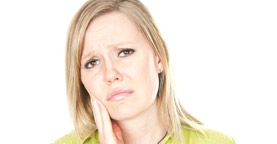 Healthy joint function has a thin cushioning fibro-cartilaginous disk in between the top and bottom jaws, working in coordination with muscles and ligaments. Prolonged clenching and grinding or a bite that doesn’t support the jaw joints in a healthy way leads to dysfunction of the coordinating muscles of the jaws and the disk. The disk can then pop out of place allowing you to hear your joint click and pop as it moves on and off the disk. This can compress the small blood vessels and nerves in the back of the joint causing pain and can eventually perforate through causing bone on bone wear.
Healthy joint function has a thin cushioning fibro-cartilaginous disk in between the top and bottom jaws, working in coordination with muscles and ligaments. Prolonged clenching and grinding or a bite that doesn’t support the jaw joints in a healthy way leads to dysfunction of the coordinating muscles of the jaws and the disk. The disk can then pop out of place allowing you to hear your joint click and pop as it moves on and off the disk. This can compress the small blood vessels and nerves in the back of the joint causing pain and can eventually perforate through causing bone on bone wear.
In early stages it can seem like it is not a problem but continued progression can lead to joint deterioration, pain and dysfunction. Eventually the disk may remain permanently displaced which can restrict jaw opening. You may have heard of people who have a history of clicking and popping and then suddenly get “lock jaw” and are unable to open their jaws as before.
Tired Muscles
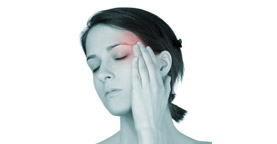 The shape and structure of your jaws can determine the type of deterioration that occurs within your bite system and muscles. For example, people with square jaws are much more susceptible to muscle pain from bite forces because this gives them a greater mechanical advantage and predisposition to clenching and grinding which in turn can lead to greater deterioration of the tm joints and pain.
The shape and structure of your jaws can determine the type of deterioration that occurs within your bite system and muscles. For example, people with square jaws are much more susceptible to muscle pain from bite forces because this gives them a greater mechanical advantage and predisposition to clenching and grinding which in turn can lead to greater deterioration of the tm joints and pain.
Awakening with awareness of your jaw and surrounding muscles can be a sign that your body has been in action while you sleep, clenching and grinding your teeth!
People who find themselves needing to massage their cheeks, temples or head, may be reacting to overactive chewing muscles which have been pumping subconsciously while driving, working out or concentrating. Treating your bite and joints, can relieve head, neck, shoulder and muscle pain!
Head, Neck & Facial Pain
People don’t realise that headaches, neck aches and facial muscle pain are all related to your bite. An improper bite can lead to clenching and grinding and can then cause overwork of the muscles of the head and neck leading to headaches, migraine type pain and jaw joint pain.
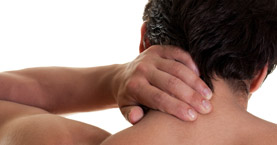
It has been demonstrated that if you clench your teeth, the muscles at the back of the neck contract. The degree of contraction is proportional to the force of clenching. So it is not surprising that people who clench and grind experience neck aches and tension headaches which start from the back of the head and can also affect the vertebre of the neck. People live every day with headaches, neck pain and low back pain, not realising that it relates to their mouth, jaw and teeth and that it can be relieved by having a stable bite and jaw joints.
These can be treated, according to the specific issues, by a knowledgeable dentist.
Unstable bite
People with floating bites or who can’t seem to find their bite often feel discomfort or pain in their joints and muscles. Changes to the bite can happen after trauma to the jaw, loss of teeth, extensive dentistry or prolonged mouth opening. If your bite is unstable or your jaw joints and teeth not functioning in coordination this can lead to clenching, grinding, or pain. A bite or occlusion specialist can help you find your correct, stable bite and help to relieve the tension or pain in the joints and muscles.
Ringing Ears or Hearing Loss
This can be caused by tension in associated structures due to clenching and grinding and has been shown to be relieved when the joints are decompressed and the bite is supported.
Some studies show a link with up to 80% of TMD cases resulting in ear symptoms like excessive ear wax, hearing loss or sounds of fullness or ringing in the ears. Most TMD patients who complain of ear related symptoms often find relief in therapeutic treatment.
Dizziness
The inner ear mechanism is associated with balance. Chronic tension and stress in surrounding areas such as the jaw joints, muscle attachments, related to jaw clenching and grinding, can affect this and lead to dizziness. De-stressing these components can help relieve this.
Snoring
 Snoring is a symptom of a small upper jaw and a restricted airway which in turn lead to mouth breathing and the tongue falling back restricting airflow. The restricted passage of air through the mouth can cause your soft palate or back of your throat to vibrate causing you to snore and disturb your rest and your partner’s! This disruption to your sleep has a major impact on health and stress levels as restricted oxygen effects cellular function and all systems in the body. Treating this through dentistry can help relieve this and have a major impact on your positive health and relationship.
Snoring is a symptom of a small upper jaw and a restricted airway which in turn lead to mouth breathing and the tongue falling back restricting airflow. The restricted passage of air through the mouth can cause your soft palate or back of your throat to vibrate causing you to snore and disturb your rest and your partner’s! This disruption to your sleep has a major impact on health and stress levels as restricted oxygen effects cellular function and all systems in the body. Treating this through dentistry can help relieve this and have a major impact on your positive health and relationship.
Sleep Apnea
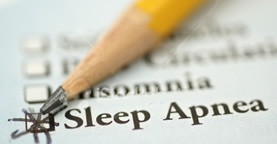 Sleep apnea is a life threatening condition defined by episodes of restricted breathing (holding your breath) while sleeping and a sudden gasp for air. This can happen multiple times in a night, depending on the severity. Sleep apnea studies have shown that having this disorder can shorten your life span by 8-18 years. Sleep apnea is also linked with cardiovascular disease, hypertension/high blood pressure, stokes and diabetes.
Sleep apnea is a life threatening condition defined by episodes of restricted breathing (holding your breath) while sleeping and a sudden gasp for air. This can happen multiple times in a night, depending on the severity. Sleep apnea studies have shown that having this disorder can shorten your life span by 8-18 years. Sleep apnea is also linked with cardiovascular disease, hypertension/high blood pressure, stokes and diabetes.
Though the recognized gold standard for treatment of sleep apnea is the CPAP (positive air pressure) device, many people cannot tolerate this and do not wear it. As an alternative there are various dental appliances which, depending on the severity of your sleep apnea, can be used to help the condition. They are also great for traveling as you don’t have to carry cumbersome equipment around with you. It is important to obtain a proper diagnosis first and we can help you to do this as we work with the appropriate medical professionals in order to help you achieve the best possible care.
Forward Head Posturing
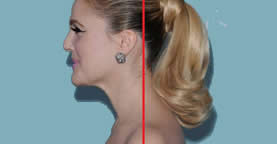 Restricted airways and clenching and grinding problems can result in tension in head and neck muscles and cause forward posturing of the head and pain or tension headaches. This in turn affects the neck and shoulder muscles resulting in a typical forward head posture, hunched with the palms rotated backwards and possible tingling of the arms and hands. Correcting these dental related issues and appropriately related physical therapy will help with regaining vertical head posture which in turn affects correct body posture.
Restricted airways and clenching and grinding problems can result in tension in head and neck muscles and cause forward posturing of the head and pain or tension headaches. This in turn affects the neck and shoulder muscles resulting in a typical forward head posture, hunched with the palms rotated backwards and possible tingling of the arms and hands. Correcting these dental related issues and appropriately related physical therapy will help with regaining vertical head posture which in turn affects correct body posture.
Performance Athletics
 Do you perform your best every time? Can you be sure? Having a specifically designed mouth guard, customized to a bite appropriate for you, can improve your athletic performance just like the pros. These appliances increase strength, improve airway opening, reduce stress from clenching, increase endurance, reduce lactic acid build up, speed up reaction times to auditory and visual cues, reduce cortisol stress, fatigue and distraction, and reduce impact to the jaw and head.
Do you perform your best every time? Can you be sure? Having a specifically designed mouth guard, customized to a bite appropriate for you, can improve your athletic performance just like the pros. These appliances increase strength, improve airway opening, reduce stress from clenching, increase endurance, reduce lactic acid build up, speed up reaction times to auditory and visual cues, reduce cortisol stress, fatigue and distraction, and reduce impact to the jaw and head.
Stress
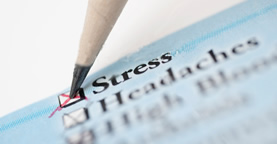 One of the main reasons why so many people suffer from a tense or aching jaw is because the nerves that innervate the muscles of the jaw: the Temporalis, Masseter, and Pterygoid muscles, are associated with centers in the brain related to our flight or fight response when we are stressed.
One of the main reasons why so many people suffer from a tense or aching jaw is because the nerves that innervate the muscles of the jaw: the Temporalis, Masseter, and Pterygoid muscles, are associated with centers in the brain related to our flight or fight response when we are stressed.
When we are under a lot of stress and likely not getting a lot of sleep this can create a tension in our Jaw muscles and put abnormal pressure on the TMJ joint causing pain. Stress also leads to unreleased, nervous energy. It is very common for people under stress to release this nervous energy by either consciously or unconsciously grinding and clenching their teeth. The greater the emotional stress, the greater severity and duration we take this stress out on our teeth and jaws. This can even lead to “Lock Jaw.”
Another way stress contributes to TMJ is that during times of stress your adaptability and pain threshold will go down. As a result you are more likely to experience symptoms of TMD if other factors already exist (bruxing, joint damage, etc.).
Underlying Medical Conditions
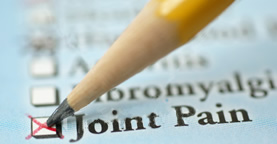 In some people, an underlying medical condition can be the cause or catalyst for their TMJ disorder. Here is a partial list of some of the conditions that could precipitate a TMJ condition: Depression, Post-traumatic Stress Disorder, Anxiety Disorders, Fibromyalgia, Eating Disorders, Substance Abuse, Macro-Trauma, such as a punch to the jaw or impact in an accident, Meniere’s Disease, Rheumatoid arthritis, Osetoarthritis and more.
In some people, an underlying medical condition can be the cause or catalyst for their TMJ disorder. Here is a partial list of some of the conditions that could precipitate a TMJ condition: Depression, Post-traumatic Stress Disorder, Anxiety Disorders, Fibromyalgia, Eating Disorders, Substance Abuse, Macro-Trauma, such as a punch to the jaw or impact in an accident, Meniere’s Disease, Rheumatoid arthritis, Osetoarthritis and more.


